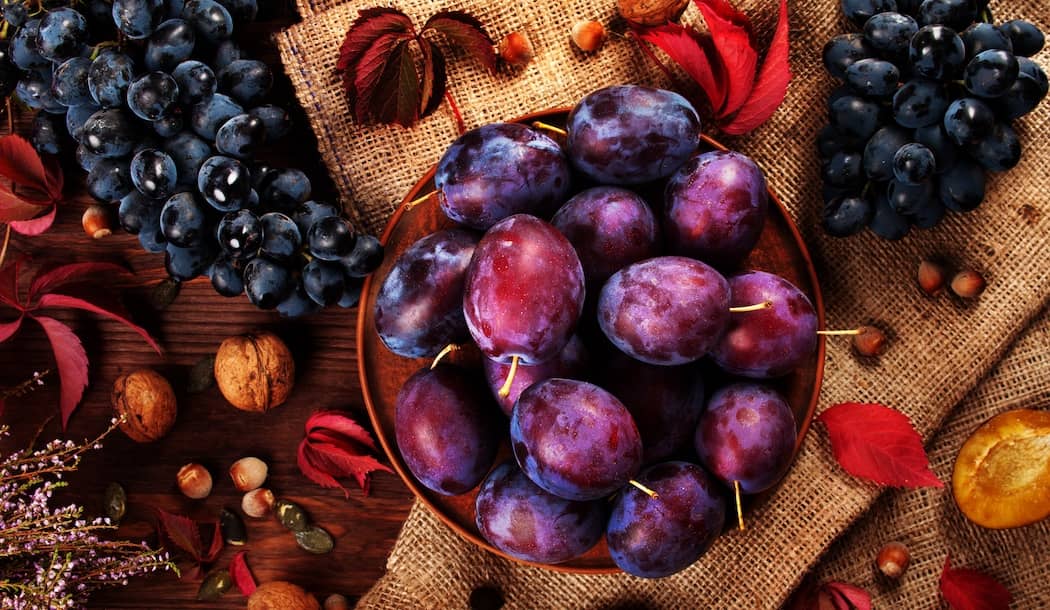
I’ve written before about anthocyanins, the antioxidants responsible for the dark pigmentation in berries and blue-black fruits like grapes and plums, but anthocyanins actually break down into subcategories, one of which is cyanidins.
Cyanidins are important because they happen to be the most “pharmaceutically effective” anthocyanin subcomponent available, especially when it comes to fighting cancer.1
Allow me to explain…
Antioxidants in grapes have been studied extensively, particularly as they relate to cancer prevention. But most of that research has focused on two familiar grape compounds, resveratrol and quercetin. The whole grape, from a phytochemical point of view, consists of a lot of other phytonutrients that include kaempferol, catechin, epicatechin, and anthocyanins (cyanidin and malvidin).2
In fact, it’s the cyanidins, (specifically cyanidin-3-O-β-glucopyranoside, or C3G), that appear to have the most powerful cancer-fighting properties.
Cyanidins fight breast and prostate cancers
When C3G was tested on prostate cancer cell lines, there was a clear increase in DNA fragmentation and tumor suppression – all of which means C3G represents a pretty effective way to reduce carcinogenesis.3
In a separate study, C3G was found to weaken breast cancer-induced angiogenesis (that is, the development of new breast cancer cells). C3G does this by hindering vascular endothelial growth factor (VEGF), a key cytokine for the growth and development of cancer.4
And still another study showed the C3G is helpful against the expression patterns of estrogen receptors that lead to melanoma, making it a potential therapeutic and preventive treatment for keeping this deadly skin cancer at bay.5
Getting more cyanidin
Fortunately, C3G is the most abundant anthocyanin in the edible natural plant world.6 Grapes are arguably the best source for this particular antioxidant, though you’ll find high levels of cyanidins in all darker-skinned fruits and vegetables – the darker, the better.7
One study actually showed grapes have more than 1,600 phytochemicals, the composition of which varies quite a bit among the different types of grapes out there. Beyond that, grapes also boast substantial levels of vitamin A, vitamin C, folic acid, iron, calcium, potassium, and magnesium, among other nutrients that can boost your immune system and help your overall health.8
In addition to eating grapes you can also supplement with grape seed extract.
Grape seed extract proven
against cancer in clinical study
Researchers at the University of Colorado put grape seed extract to the test against prostate cancer last summer.
They followed 20 prostate cancer patients who’d completed surgery, radiation treatment or both for their prostate cancer. Each man also had a rising PSA (prostate specific antigen) number—a marker for prostate cancer tumors.
Researchers gave them 150mg of grape seed extract twice daily for a year and found that nearly half (nine patients) saw their disease progression slow, as measured in the amount of time it took for their PSA numbers to double (30 percent longer or more.) Overall, the PSA doubling time rose from 5.4 months to 6.4 months – slightly less than 20 percent — suggesting the grape seed extract helped to slow the production of cancer cells.
In addition, three patients saw their PSA levels decrease.
Researchers believe the reason that grape seed extract is so powerful against prostate cancer is a cyanidin called procyanidin B2 3,3″-di-O-gallate, better known as B2G2. Numerous laboratory studies, also performed at the University of Colorado, show that grape seed extract not only inhibits the growth of prostate cancer tumors, but causes the cells that drive the growth to die.
What’s more, a 2009 study found that grape seed extract administered to mice was effective in slowing the growth of not only prostate but also skin, colorectal and breast cancers.
My Takeaway
We already know that a diet rich in fruit and vegetables can lower your risk of cancer, but even more so than that, eating foods with cyanidins such as grapes, plums and dark berries offers a new and scientifically documented strategy for both the prevention and treatment of multiple cancers.
In fact, C3G is most active in the concentrations you get naturally from food intake, and best of all it doesn’t pose any risk of toxicity to your body.9 So, as warmer weather approaches, the more dark-colored fruit you can load into your picnic basket the better.
Best regards,

Lee Euler,
Publisher
References:
- https://examine.com/supplements/cyanidin/
- https://www.ncbi.nlm.nih.gov/pmc/articles/PMC4911802/
- https://www.spandidos-publications.com/10.3892/ijo.2015.3130
- https://pubmed.ncbi.nlm.nih.gov/30251280/
- https://www.frontiersin.org/articles/10.3389/fonc.2019.01110/full
- https://www.spandidos-publications.com/10.3892/ijo.2015.3130
- https://www.ncbi.nlm.nih.gov/pmc/articles/PMC4911802/
- https://www.ncbi.nlm.nih.gov/pmc/articles/PMC4911802/
- https://www.spandidos-publications.com/10.3892/ijo.2015.3130